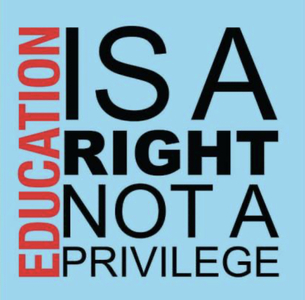100 signatures reached
To: Secretary of Education, Miguel Cardona
Access to education is a right not a privilege.

To: Secratary Miguel Cardona
I am deeply concerned about the recent Supreme Court decision to gut affirmative action while leaving protections in place for legacy admissions. This decision undermines equal opportunity and diversity, favoring white and wealthy individuals while pushing Black and brown communities to the margins.
I am deeply concerned about the recent Supreme Court decision to gut affirmative action while leaving protections in place for legacy admissions. This decision undermines equal opportunity and diversity, favoring white and wealthy individuals while pushing Black and brown communities to the margins.
Why is this important?
The Supreme Court's ruling is a devastating blow to equal opportunity and diversity. By axing race-conscious admissions but leaving protections in place for legacy admissions, the court is perpetuating a system that caters to the privileged and widens the inequality gap. This decision disregards the promises made to Black and brown families about fair opportunities for education, work, and economic stability.
I believe that access to education is a right, not a luxury. This ruling favors those who are born into privilege, while leaving marginalized communities behind. It is out of touch with the current needs of our country and denies the reality of systemic racism and the urgent need to address historical injustices.
We all benefit from diverse communities that bring together different voices, experiences, and backgrounds. It is the lifeblood of a strong democracy, and we cannot let this decision roll back decades of progress and trample on the principles of equal protection.
However, I believe that there is still hope. Colleges and universities have the power to prioritize diversity and inclusion, even in the absence of affirmative action policies. We have seen this in the state of California, where public schools had to find alternative ways to address educational disparities after affirmative action was voted down almost 30 years ago.
Therefore, we urge colleges and universities to take immediate action to prioritize diversity and inclusion in their admissions processes. This can be achieved through various means, such as implementing holistic admissions processes that consider a wide range of factors, expanding outreach efforts to underrepresented communities, investing in scholarships and financial aid programs for marginalized students, creating mentorship and support programs, and collaborating with community organizations and schools to develop pipeline programs.
By taking these steps, colleges and universities can demonstrate their commitment to addressing educational disparities and promoting a more inclusive and equitable society. Access to education should be a right for all, not a luxury for a privileged few.
Therefore, I call on colleges and universities to prioritize diversity and inclusion in their admissions processes and take proactive measures to address educational disparities. Together, let us challenge the Supreme Court's decision and fight for a more just and equal society.
Sincerely,
Jonathan McGinley
Portland, Oregon
I believe that access to education is a right, not a luxury. This ruling favors those who are born into privilege, while leaving marginalized communities behind. It is out of touch with the current needs of our country and denies the reality of systemic racism and the urgent need to address historical injustices.
We all benefit from diverse communities that bring together different voices, experiences, and backgrounds. It is the lifeblood of a strong democracy, and we cannot let this decision roll back decades of progress and trample on the principles of equal protection.
However, I believe that there is still hope. Colleges and universities have the power to prioritize diversity and inclusion, even in the absence of affirmative action policies. We have seen this in the state of California, where public schools had to find alternative ways to address educational disparities after affirmative action was voted down almost 30 years ago.
Therefore, we urge colleges and universities to take immediate action to prioritize diversity and inclusion in their admissions processes. This can be achieved through various means, such as implementing holistic admissions processes that consider a wide range of factors, expanding outreach efforts to underrepresented communities, investing in scholarships and financial aid programs for marginalized students, creating mentorship and support programs, and collaborating with community organizations and schools to develop pipeline programs.
By taking these steps, colleges and universities can demonstrate their commitment to addressing educational disparities and promoting a more inclusive and equitable society. Access to education should be a right for all, not a luxury for a privileged few.
Therefore, I call on colleges and universities to prioritize diversity and inclusion in their admissions processes and take proactive measures to address educational disparities. Together, let us challenge the Supreme Court's decision and fight for a more just and equal society.
Sincerely,
Jonathan McGinley
Portland, Oregon
